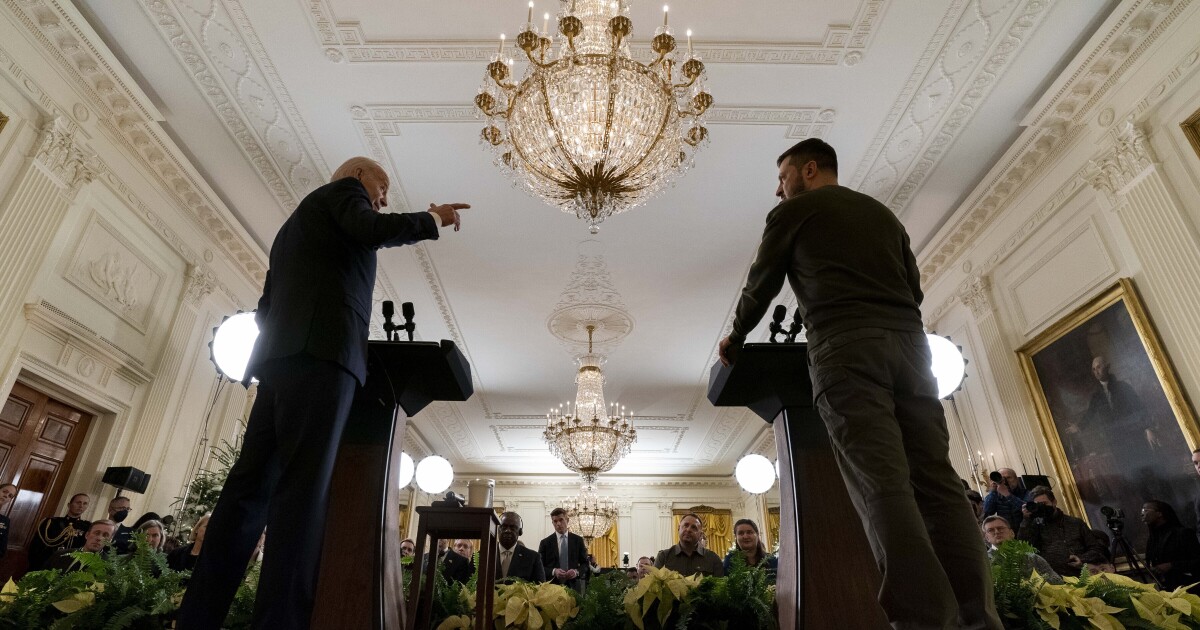

President Joe Biden‘s decision to link Ukraine and border funding is coming back to haunt him as Congress has remained stalled on striking a deal that would secure funding for the nation’s war against Russia.
Biden’s dilemma comes as he and Ukrainian President Volodymyr Zelensky are to present a united front in public this week as part of a last-ditch effort to secure U.S. funding for Ukraine’s defense beyond the end of the year, an increasingly unlikelihood as it has become conditional on a border security and immigration reform side deal.
BIDEN LOSING YOUNG VOTERS TO TRUMP AS HE FALLS BEHIND IN TWO SWING STATES
Zelensky is poised to underscore the “big picture” of the Russia-Ukraine war Tuesday during his visit and meetings with Biden, House Speaker Mike Johnson (R-LA), and a bipartisan group of senators, according to Michael O’Hanlon, foreign policy senior fellow and research director at the Brookings Institution. For instance, how Russia is not only a “danger” to Ukraine but, if “unchecked,” to NATO and to the U.S. as well, per O’Hanlon.
“In that light, Ukraine is fighting our collective fight, and helping it do so isn’t charity,” he told the Washington Examiner. “[Zelensky] will talk about specific gaps and needs and vulnerabilities that cannot really wait for weeks or months, like air and missile defense.”
Biden and Zelensky contend that the Russia-Ukraine war undermines Ukraine, its allies, and democracy. For Rebeccah Heinrichs, defense senior fellow at the Hudson Institute, that should put more pressure on Biden to negotiate with Republicans on the border and immigration before lawmakers depart Washington, D.C., for the holidays this week.
“President Biden has made this war the quintessential democracy vs. autocracy [conflict],” Heinrichs said. “If the Biden administration does not put in serious border provisions to deliver what Republicans have been demanding for months, then the entire argument that democracy hangs in the balance with Ukraine will be proven a farce.”
“It is a moment where both parties need to understand that they’re going to have to collaborate and come up with a [funding] supplemental that continues to enable Ukraine to degrade our top-tier strategic adversary, which is the Russian military,” she added, encouraging Biden to strengthen Ukraine’s long-range defense capabilities.
American Enterprise Institute foreign policy senior fellow Dalibor Rohac, who described the sit-downs as a “sign” of Ukraine’s “alarm,” agreed Biden’s “path forward ought to be clear,” including “substantial” border funding.
“Other than disappointing the activist class, this would be good for Ukraine and also for Biden’s own electoral prospects next year as the border situation will clearly play a role in voters’ decisions,” he said.
Robert Greenway, a former Trump White House National Security Council official and now director of Heritage Foundation’s Center for National Defense who has criticized Biden for his lack of strategy, Ukraine for its lack of transparency, and Europe for its lack of accountability, asserted Biden has hindered himself by proposing that Congress pass a Ukraine and border funding supplemental together.
“They’ve frozen all of them,” he said. “What’s worse than all of that is, look, even if the Democrats got what they wanted, they got a supplemental through with Ukraine funding, which still may happen, it’s not going to solve anything. We’re just going to be back here in six months, talking about how much more money Ukraine needs without any idea of what’s going to happen to that or what difference it is going to make.”
But for Greenway, the political standoff between Democrats and Republicans is not purely about Ukraine funding but “broader priorities.”
“The American people, as you and most I think now recognize, the message they’re sending is our economic situation is such that it’s hard to entertain the idea of sending money overseas,” he said. “The border crisis in the United States is such that most Americans don’t want to see money spent on someone else’s security situation so long as theirs suffers as a consequence.”
Zelensky’s trip to Washington comes after he missed a virtual meeting with Senate Republicans last week, exacerbating already low expectations despite Biden’s willingness to compromise and some Democrats considering, for example, reducing the number of asylum claims. Jay Truesdale, CEO of global political risk advisory firm Veracity Worldwide, called Biden and Zelensky’s sit-down a “high risk, high reward” gamble.
CLICK HERE TO READ MORE FROM THE WASHINGTON EXAMINER
“At a minimum, Zelensky can count on a warm embrace from the U.S. administration,” he said. “He will also hear positive signals on the transfer of proceeds from seized Russian assets, but he could leave Washington with relatively little to show.”
Zelensky arrived in Washington on Monday, addressing U.S. military service members at the National Defense University before Tuesday’s all-important agenda.




